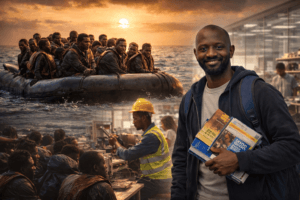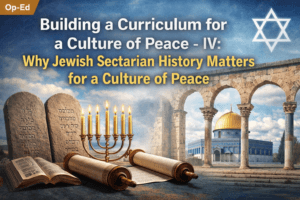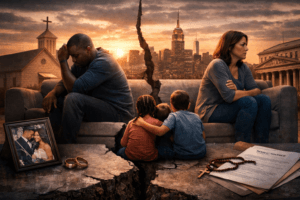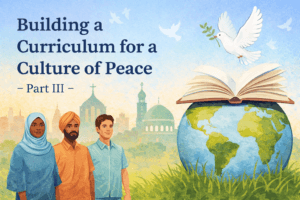Peace December as Sacred Space: Are We Passive Recipients or Co-creators?

By Rebecca Abrahamson
My first encounter with Peace December – Friday afternoon in July 2016, during an all too brief visit to New York City, Muslim activist Dr. Omer Salem tipped me off and said I have got to meet Sheikh Moussa Drammeh. Within a couple of hours I was blessed not only to meet the soft-spoken, unassuming Shiekh, but also his activist colleagues and a group from Peace December. Friday afternoon was turning into the evening, I had to rush to my cousins in Brooklyn to observe my heavenly-bestowed sacred time of the Jewish Sabbath. But I had just witnessed community-made sacred space, and I want to share it with you.

Sacred space and time bestowed from Above are transcendent and cannot be altered by human intervention. We can interact with heavenly-bestowed sacred space and time, choose to ignore, even desecrate, but they are not in our power to alter. They are opportunities, it is up to us how we use them as they inevitably pass by, whether we engage or not.
When sacred time overlaps with sacred space, we have a double challenge and double opportunity – a holy deadline and destination. The churches in Bethlehem filled to bursting at Christmastime, the yearly Hajj pilgrimage to Mecca which is proscribed during the last month of the Islamic calendar, Dhu al-Hijjah, the thrice yearly pilgrimage to the ancient Temple in Jerusalem which must take place during the festivals of Passover, Shavuot and Sukkot. Since we cannot determine these times or destinations, we must leave aside our busy lives, letting go of what shapes our very identity on a day to day basis, and merge with something larger.
We cannot erase heavenly-bestowed sacred space and time – indeed, they are meant to erase us – our wills and egos – discovering ourselves to be a tiny speck in the cosmos after all.
But we can invent community-made sacred space, indeed, we may just have a mandate to do so.
Abrahamic faiths are balanced; we are not here to spend all our time merging with the greater Whole. There is work to be done here and now. Build a mosque, a synagogue, church – a local sacred space that will remind us of the ultimate center, whether Mecca for the Muslims or Jerusalem for the children of Israel, as we fan out over the globe, returning to the mundane, bringing a portable sacred space with us.
“And God created man in His own image, in the image of God created He him; male and female created He them” Genesis 1:27 pronounces. Created in God’s image, we are enjoined to imitate the Creator, and what better way than to build sacred spaces as He did, to appoint sacred times, following His example? Peace December is one such effort; tackling head-on the challenge of the December holidays as experienced in North America, recognizing that holiday times can cause a disruptive level of stress. As Sheikh Moussa Drammeh says, let’s stop reacting and be proactive, let’s focus energies on peace-building during this challenging month.
I had the honor of meeting Protestant minister Ken Newell of Belfast, who, along with Catholic priest Gerry Reynolds, trail-blazed Catholic-Protestant dialogue in terror-torn Northern Ireland. Their efforts contributed to the 1998 Good Friday cease fire agreement, which committed to “exclusively democratic and peaceful means of resolving differences on political issues” . A resounding No! to more bloodshed.
In his memoir, Reverend Newell notes, “Personal change is usually the ground from which the vocation to Peacemaking grows.” Start by making peace in the home, he says, and that peace will resonate with the cosmos. He and Father Reynolds created a private space for dialogue – their own community-made sacred space. Their people gathered together – which in itself meant overcoming huge personal hurdles. They talked, shouted, cried – and finally got somewhere. Newell and Reynolds began with one-on-one relationships, building up to a nation-wide peace treaty. Efforts at peace-making are created in God’s image, so it had to work, and it did!
I love the energy of multicultural and multifaith gatherings. There is an excitement in being part of building bridges that can create something new, the respectful coming together of differences seems to bring out the best in people. The Qur’an describes this phenomenon, and I suppose that is to be expected; the Qur’an as the crown of the Abrahamic faiths, the voice of experience. “If Allah had so willed, He would have made you a single people, but (His plan is) to test you in what He hath given you: so strive as in a race in all virtues. The goal of you all is to Allah; it is He that will show you the truth of the matters in which you differ.” (Qur’an 5:48)
As we meet in community-created sacred spaces, such as Peace December activities, remember that you are acting as co-creator. Your participation will definitely be blessed, and it will bring out your very best. Could it lead to borough-wide or even nation-wide peace treaties? Well, give it a try!
———————————————-
Rebecca Abrahamson is passionate about the common heritage between Islam and Judaism, and in that capacity is co-director of the AlSadiqin Organization, along with her husband Rabbi Ben Abrahamson.














